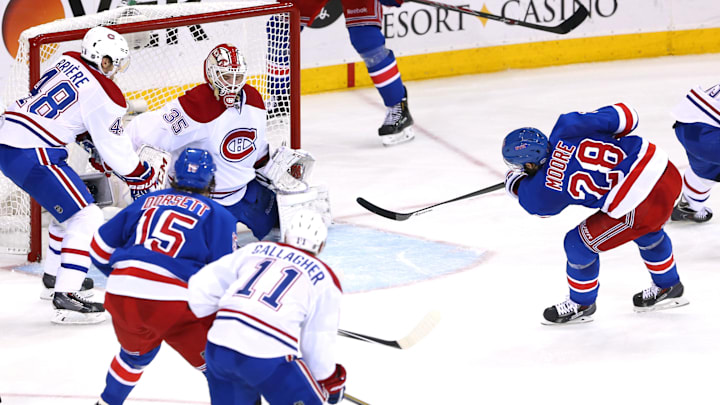Dominic Moore first joined the New York Rangers in 2000 after being drafted in the third round out of Harvard. He made his NHL debut during the 2003-04 season, recording three assists in five games. Following the cancelled 2004-05 campaign due to the lockout, Moore’s official rookie season came in 2005-06. After just 82 games as a Blueshirt, he was traded to the Nashville Predators, who quickly flipped him to the Pittsburgh Penguins. Over the next several years, Moore played 443 games for various teams. After missing the 2012-13 season due to the loss of his wife Katie who died in 2013 after a nine-month battle with liver cancer, Moore returned to Broadway for the 2013-14 campaign. That season was the beginning of a remarkable second act in New York, defined by perseverance, that inspired both the Rangers and their fans.
Moore was a free agent in 2013 and the Rangers checked in with interest to sign him after the lockout had lifted, but he wasn't ready to do anything right away. He ultimately joined the team on a one-year deal in July of 2013, and suited up for the team in the fall serving as an important veteran on the fourth line.
In his first season back as a Ranger, Moore skated in 73 games and posted a line of 6-12-18 skating 11:44 a night while winning 54.6 percent of his faceoffs. He elevated his game in the playoffs for New York tallying a line of 3-5-8 in 25 games, and he scored one of the most important playoff goals in recent memory.
Moore was awarded the Bill Masterton Trophy for the 2013-14 season as the player who who “best exemplifies the qualities of perseverance, sportsmanship, and dedication to hockey,” and it was an easy choice for voters to make considering what he went through, and how he performed for the Rangers during a season that they just fell short in the Stanley Cup Final.
As good as Moore was in 2013-14, he took things to another level in 2014-15 which was a year that the Rangers won the Presidents' Trophy as the top team in the league. That year Moore scored 10 goals and added 17 assists for 27 points in 82 games, and once again he was an ace at the faceoff dot by winning 54.5 percent of his draws. He was as effective in the playoffs, this time he had a lone goal and two assists for three points in 19 games, and the Rangers ultimately were eliminated by Tampa Bay in the Eastern Conference Final.
Moore's final season with the Rangers came in 2015-16, and he finished the year with just 15 points (six goals and nine assists) in 80 games while also winning 55.3 percent of his faceoffs. He added a goal in the playoffs, and he would join the Boston Bruins in free agency that summer. He'd skate 82 games for them tallying 25 points, and finished his career with the Toronto Maple Leafs tallying 12 points in 50 games.
When all was said and done, Moore appeared in 897 regular season games, he scored 106 goals, assisted on 176 others and compiled 282 points. He averaged 13:12 for his career and finished with a career faceoff win percentage of 54.2 percent. He skated in 101 playoff games and scored 12 goals while assists on 17 others for 29 points.
Moore was an effective third and fourth liner for the majority of his career, an important glue guy, and he was a respected veteran who helped young players . He's been an ambassador for the NHL and their Hockey Fights Cancer initiative, and is still around the game today working as a game and studio analyst for the Utah Mammoth.
Moore's second act with the Rangers was very special, and in many ways he's an unheralded part of the 2013-14 team who probably would have been remembered today like Stephane Matteau is had that squad been able to win the Stanley Cup. For him to accomplish what he did after such a tragic loss is tremendously inspiring, and something fans will remember for however long they are a fan of the Rangers.
Moore is truly one of the good guys of the game, and it was great to see him return to the team that drafted him and for him to have a on-ice lasting impact on the organization that rivals another "contribution" he made as a youngster.
